- SAMSUNG
- SAMSUNG
- SAMSUNG
- SAMSUNG
- SAMSUNG
- SAMSUNG
- SAMSUNG
- SAMSUNG
- SAMSUNG
- SAMSUNG
- SAMSUNG
- SAMSUNG
- SAMSUNG
- SAMSUNG
- SAMSUNG
- SAMSUNG
- SAMSUNG
- SAMSUNG
- SAMSUNG
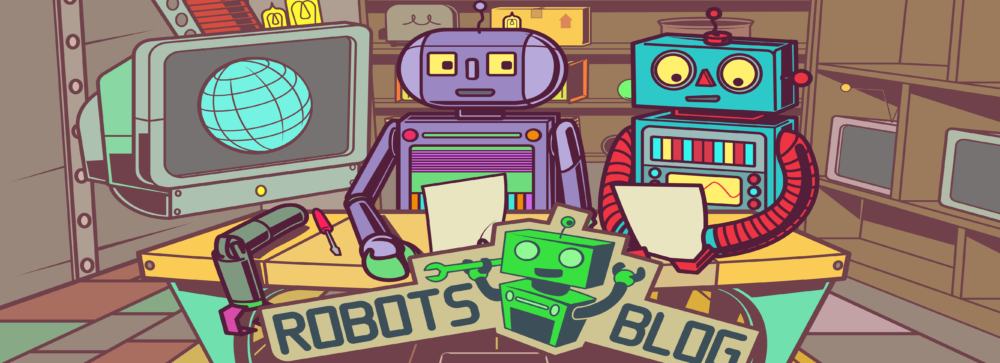
ELFi Robotics startup by Google Science Fair finalist Mark Drobnych is now on Kickstarter
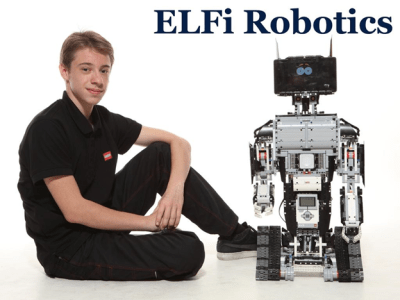
28 of October 2015 – New startup ELFi Robotics based in Ukraine announced today that it is raising funds via rewards crowdfunding campaign on Kickstarter to finish the development of their revolutionary Android apps for robotic applications. The company set out to raise £33,000 on KickStarter to finish development of innovative software platform for DIY smart robots built with wide-accessible construction sets of Lego, Tetrix, Arduino and Raspberry Pi .
ELFi Robotics offers a Minimal Viable Product – Robotic Platform for learning and building intelligent robots. This platform comprises of: Brain App for Android (iOS soon), Robots, Platform Tools, RoboMarket, Training program.
ELFi Brain App is a robotic brain which can be installed on Android device and connected to LEGO EV3, Arduino or Raspberry Pi controllers. So any LEGO Robot can receive its missed brain from now on!
ELFi Educational Program covers both hardware and software aspects required to understand basics of robotics. Both aspects start from very simple patterns and don’t assume any previous experience in robotics. ELFi Robotics WorkBook and Building Instructions Book by Mark allow a quick start for any beginner.
The powerful concept of RoboMarket and “Robotics for programmers” book allows third-party developers to write applications for ELFi Robots and even sell them.
According to Mark Drobnych, 15 years old CEO of ELFi robotics: “Our main target is to provide robots to everybody. Nowadays, real robots are really expensive and rare. I think it’s time to enter the new era of technologies. Build your own robot, with own design, and own set of functions! Our Brain app and platform are flexible enough to support new robotics ventures.”
The story begun two years ago when 13-years old Mark Drobnych worked on his personal scientific research: School Presentation of Microscope. The results of this work were presented at the Final of Google Science Fair 2014 in Mountain View, California. As functions of microscope started being more complex Mark had an idea to create an universal Robotic Brain on top of Android operating system. This Brain had to create human-friendly spoken interface not only for his Presentation of Microscope but for ANY ROBOTIC BODY built with Lego, Arduino, Tetrix or Raspberry Pi parts. It was ELFi birth.
To enforce his progress on software part Mark involved his dad, Oleksiy Drobnych, PhD, into the project as an experienced software engineer.
In the UK Mark is represented by Androcommerce Ltd., registered in England family firm focusing on mobile e-commerce offering.
Grasbrunn, 12.10.2015. Zunächst verbindet man die Frankfurter Buchmesse
(14.-18. Oktober 2015) nur mit Büchern, Lesen, Autoren, Literatur. Doch im
„Klassenzimmer der Zukunft“ der Frankfurter Buchmesse geht es um viel mehr
als nur das Fach Deutsch. Das Anliegen der Frankfurter Buchmesse, Bildung
innovativ, digital und international zu präsentieren, wird im Konzept des
Klassenzimmers umgesetzt, und internationale Innovationen und Entwicklungen
im Bildungsbereich werden hier erlebbar gemacht. In diesem Jahr zeigt sich
das Klassenzimmer der Zukunft noch digitaler, innovativer und vielseitiger
als in den Vorjahren: Hybrides Lernen und hybride Schulbücher stehen im
Mittelpunkt, und das Motto „Phantastische Inseln des Lernens“ führt
Schülergruppen auf neun Expeditionen zu fünf verschiedenen Themenbereichen,
mit besonderem Fokus auf Indonesien, dem diesjährigen Ehrengastland der
Buchmesse. Innerhalb des Gemeinschaftsprojektes „Hybrides Schulbuch“ können
Schülerinnen und Schüler übrigens auch auf die kniffelige Herausforderung
von LEGO® Education gespannt sein, bei der es darum geht, mit LEGO®
MINDSTORMS® Education EV3 einen Roboter zu konstruieren, der es schafft,
Müll von einem Korallenriff zu beseitigen. Kurz: Im Klassenzimmer der
Zukunft wird die Vision eines effektiven Lernens in der Zukunft schon heute
Realität.
Es sind viele gute Gründe, die für eine Integration von LEGO® Education in
das Klassenzimmer der Zukunft sprechen, denn LEGO® Education setzt mit
innovativen Lernkonzepten Meilensteine: Aus dem schulischen Sekundarbereich
der naturwissenschaftlichen Fächer ist LEGO® MINDSTORMS® Education seit über
eineinhalb Jahrzehnten nicht mehr wegzudenken. Die bereits dritte
Robotik-Generation des LEGO® MINDSTORMS® Education EV3 beinhaltet ein
äußerst vielseitiges, zeitgemäßes Lernkonzept, das in Zusammenarbeit mit
mehr als 800 Lehrkräften weltweit erschaffen wurde. Schülerinnen und Schüler
können mit der EV3-Plattform einen vollständig funktionsfähigen Roboter im
Rahmen eines 45-Minuten-Unterrichts bauen und programmieren. Ganz neu ist
eine mobile App, mit der sich nun auch außerhalb der Umgebung eines PC-Raums
oder eines Klassenzimmers Roboter-Programme erstellen lassen.
„LEGO® Education passt perfekt in das Klassenzimmer der Zukunft der
Frankfurter Buchmesse, da wir ganz besondere, innovative Konzepte für
lebenslanges Lernen entwickeln, die Schülerinnen und Schüler jeder Begabung
und Lernvoraussetzung aktiv in den Lernprozess einbinden. Zudem fördern wir
wichtige Schlüsselkompetenzen des 21. Jahrhunderts wie kreatives Denken,
Problemlösungs- und Teamfähigkeit, die für den Erfolg in der Schule und im
späteren Beruf so wichtig sind. Die Aufnahme ins Klassenzimmer der Zukunft
passt perfekt zu unserer Vision“, so Dr. René Tristan Lydiksen, Managing
Director LEGO® Education Europe.
Über LEGO® Education
Seit über 30 Jahren arbeitet LEGO® Education mit Lehrern und
Bildungsspezialisten zusammen, um Lernkonzepte und Unterrichtsmaterialien zu
entwickeln, die den Schulstoff lebendig werden lassen und Freude am Lernen
vermitteln. Das Angebot von LEGO® Education unterstützt Lehrkräfte im
kompetenzorientierten Unterricht in Geistes- und Naturwissenschaften,
Technik, Informatik und Mathematik und fördert bei jungen Lernenden das
Erlangen von Team-, Kommunikations- und Problemlösungsfähigkeiten. Diese
sollen Kinder letztlich dazu befähigen, den sich wandelnden Anforderungen
ihrer Lebenswelt gewachsen zu sein und aktiv ihre eigene Zukunft zu
gestalten. LEGO® Education hat seinen Sitz in Billund, Dänemark und Büros
auf der ganzen Welt. Mehr als 180 Mitarbeiter teilen die Vision, alle
Schülerinnen und Schüler für lebenslanges Lernen zu begeistern. Mehr unter
www.LEGOeducation.de
NEW YORK and WASHINGTON, Sept. 25, 2015 /PRNewswire/ — Today the LEGO Group announced the LEGO® MINDSTORMS® EV3 Programmer App, a new application that allows builders to create programs for MINDSTORMS robots directly from iOS and Android tablet devices. Featuring a streamlined selection of the most-used commands, the EV3 Programmer App allows for more interaction away from the desktop or laptop computer, giving users even more freedom to explore and tinker with the MINDSTORMS platform. The EV3 Programmer App will be available in free versions for iOS and Android tablets in English, German, French, Dutch, Spanish, Danish, Japanese, Chinese (Mandarin), Korean and Russian in late November 2015. The app is not a standalone experience, but designed for LEGO MINDSTORMS EV3, the LEGO construction set that allows you to build and program robots that do what you want them to do (U.S. SRP $349).
The EV3 Programmer App consists of the 11 most popular programming blocks in the LEGO MINDSTORMS software, including action blocks, flow blocks and comment blocks. After writing and saving a program within the app, a user can progress to more advanced programming by opening it in the LEGO MINDSTORMS desktop software. To provide additional inspiration for beginner robot makers, the app will feature building missions, videos and building instructions for five starter robots that represent a variety of building and programming experiences all while delivering the fun factor for which LEGO building is known.
„By extending MINDSTORMS robotic programming to tablets, we are embracing the ‚anywhere, anytime‘ of mobile devices to unleash even more creativity in building and programming with MINDSTORMS,“ said Filippa Malmegard, LEGO MINDSTORMS community manager. „When we untether the experience from the desktop, programming really becomes a playful extension of building, allowing users to add a new behavior or interactivity to their LEGO creations. This extra level of mobility will make the EV3 Programmer App an accessible and convenient programming starter experience for a new generation of users, while at the same time adding play value for our existing MINDSTORMS Community.“
From Play to Prototype: LEGO MINDSTORMS at World Maker Faire and Smithsonian Innovation Festival
To further inspire the next generation of innovators, the LEGO Group is showcasing the creativity and innovation of the MINDSTORMS Community at two high profile events this weekend, World Maker Faire, September 26-27, in New York, NY, and the Smithsonian Innovation Festival, September 26 – 27, in Washington, DC. At each event, MINDSTORMS makers will demonstrate inventions they’ve built using MINDSTORMS building sets as prototyping tools in addition to showcasing a variety of fun LEGO robots.
A number of recipients of LEGO Prototyping Kits from this summer’s Play to Prototyping Challenge, launched during the National Week of Making in June, will participate in World Maker Faire. LEGO MINDSTORMS Community Manager Filippa Malmegard will also moderate a panel on the topic „From Play to Prototype“ where featured builders will discuss how LEGO bricks and elements can serve as a creative prototyping platform for new concepts and inventions ranging from prosthetics to 3D printers. (Saturday, September 26, 3:45PM – 4:15 PM)
At the Smithsonian Innovation Festival in Washington, DC, Shubham Banerjee, the 14-year-old founder of Braigo Labs will demonstrate his braille printer built entirely from LEGO MINDSTORMS and share his process of invention with attendees. Alongside Shubham, Cameron Kruse, Fulbright alumni and LEGO MINDSTORMS builder will demonstrate a prototype for his baseball mudder, a machine that can apply the same amount of mud to each new baseball, eliminating inconsistencies in the ways mud was applied to new baseballs before they were used in a game. Both Shubham and Cameron will participate in 15 minute Q&A interviews as part of the event as well.
The EV3 Programmer App for tablets will be available through the App Store and Google Play in late November 2015. For more information on LEGO MINDSTORMS and examples of robots built using LEGO MINDSTORMS EV3, please visit www.LEGO.com/MINDSTORMS.
The Tufts University made a nice video clip about Open Roberta Lab:
Truckee, CA, May 22, 2015 – 10 Imaging Inc. launched their debut product on Kickstarter, RoboSnap. RoboSnap provides “Vision for Your Robot”, by detecting objects in the environment by their color, location, shape and size. The creator of RoboSnap, Shari Vedovato says, “We created RoboSnap to add a new dimension to your robot to allow it to have more understanding of the environment and be more autonomous.”
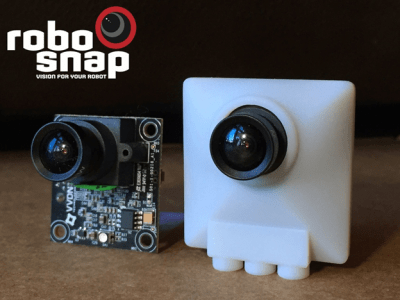
RoboSnap currently works on the LEGO® Mindstorms EV3 as well as the Raspberry Pi with the BrickPi add-on board.
Not only can RoboSnap add vision to your robot, it can be programmed with Snap!, a Scratch extension or with the Python and C programming languages. Shari says, “We provide many choices to program RoboSnap in order to support our youngest customers to our most experienced. We received a lot of positive feedback about the ability to program the EV3 with Snap! at our demonstrations at the San Mateo Maker Faire. Many kids are learning Scratch at school and it is comfortable for them to continue to program with this language as they move into robotics.” Kickstarter backers can select to receive the “JUST THE SOFTWARE” reward if they are interested in programming their robots with Snap! on the EV3.
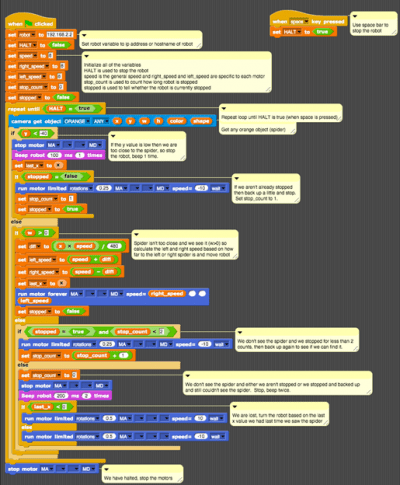
Riley Breuner, a high school student who recently competed in the FIRST Robotics League competition said, “It’s great that there’s a new sensor that can detect colors accurately and reliably. It’s almost impossible to use the existing Lego sensors because you can run the same program and get different results or it just detects the wrong color. RoboSnap is a much better option.“ Shari agreed, “When watching the recent FIRST LEGO League missions I noticed that it was difficult for the robots to perform the ‘Search Engine’ mission in one pass. It was necessary to use the ‘eyes’ of the players to determine the color. We have shown that RoboSnap can do this mission in a single pass. Although RoboSnap is not currently sanctioned to be part of the FIRST LEGO League competition, we are working on having it accepted.”
RoboSnap will be available exclusively on Kickstarter from May 13 to June 12, 2015 with the first shipments of RoboSnap cameras in October 2015.
https://www.kickstarter.com/projects/robosnap/robosnap-vision-for-your-robot
Am kommenden Wochenende wird die Landeshauptstadt Magdeburg wieder zum Treffpunkt nationaler und internationaler RoboCup Teams. Insgesamt 200 Teams mit über 1.000 Teilnehmern werden zu den spannenden Wettkämpfen in der Ottostadt erwartet. Die RoboCup German Open finden vom 24. bis zum 26. April 2015 auf der MESSE MAGDEBURG statt. Der Eintritt ist frei. Weiterlesen
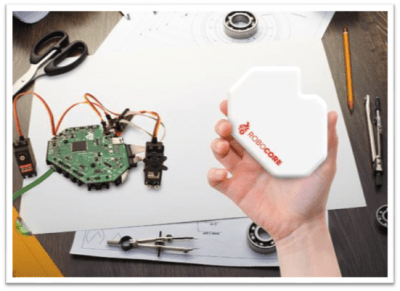
Krakow, Poland – February 11, 2015 – Husarion, a Poland-based technology start-up, today announced it is seeking funding for RoboCORE, a device that acts as the “heart” of the DIY robot. Husarion’s mission is to bring robotics into the mainstream consumer market and RoboCORE offers the ultimate solution that allow robotics enthusiasts and companies to easily build their own robots, without the need for high-level programming or engineering skills.
Husarion founders are looking to raise $50,000 to bring RoboCORE to market. Over the next 30 days, investors may support and track Husarion’s campaign at the official project page on Kickstarter.
The market for consumer and office robots is surging. A recent report from Business Insider Intelligence found that the multibillion-dollar global market for robotics, long dominated by industrial and logistics uses, has begun to see a shift toward new applications. According to BI, There will be a $1.5 billion market for consumer and business robots by 2019. BI also projects the market for consumer and office robots will grow at a CAGR of 17 percent between 2014 and 2019, seven times faster than the market for manufacturing robots.
“The design and production of robot components is so costly that robots are currently used mainly for military and industrial purposes,” said Dominik Nowak, CEO at Husarion. “There’s been little or no opportunity for robotics to become widespread. Our mission is to make out-of-the-box modules available so that anyone can create an inexpensive robot with advanced capabilities.”
RoboCORE is a combination of software and hardware, packaged in a sleek, heart-shaped device. Unlike other robotics systems, RoboCORE allows users to control or code from anywhere in the world, as well as stream both audio and video. RoboCORE’s rich peripherals, high-performance CPU and intuitive software enable robot makers to create without limits.

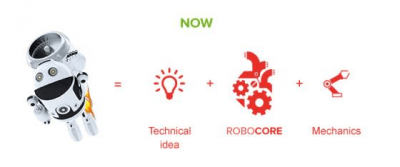
Building simple telepresence robots with a RoboCORE module is easy. Consumers can simply use old smartphones and tablets to control the robot by connecting them to an app, and then connect the construction with a cloud app, using a Wi-Fi or mobile (3G, LTE) network. The cloud-based RoboCORE app is a hub for managing all robots. Users can log in through a web browser, program and control the robot, and even share their project with friends.
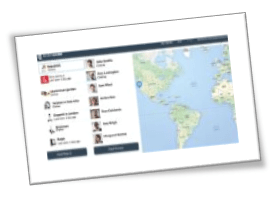
RoboCORE will be useful for a variety of business settings and in solving real human problems. The module is also ideal for students and hobbyists, who will now be able to create and design complicated constructions that were previously impossible to build inexpensively, or without advanced programming skills. In addition, RoboCORE is compatible with any mechanics system, including pieces from popular LEGO® MINDSTORMS® sets.
The small (115×125 mm for the basic version, 82×82 mm for mini) device conceals a number of components with high scaling capabilities. Internal components include the Cortex-M4 core microcontroller, Intel Edison miniature computer with Wi-Fi and Bluetooth 4.0 connectivity, DC engine ports with encoders, sensor ports, extension modules (for instance, for servomechanisms), a slot for microSD cards, and a microUSB socket. On Kickstarter, Husarion is also presenting the RoboCORE-mini, an even smaller module with basic features for beginners, as well as extensions.
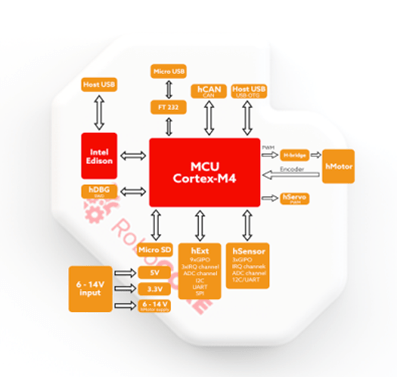
“We believe that today’s consumer robotics is at the same development stage as the computer industry in the late 1970’s. Not many people then appreciated young electronics enthusiasts. Now, it’s similar with robot makers,” says Radoslaw Jarema, CTO of Husarion. “We’ve created RoboCORE because we know that the world is on the eve of another technological revolution. The age of the personal computer has been here for a while—and now it’s time for personal robots. We hope that the Kickstarter community will receive our project well and support it.”
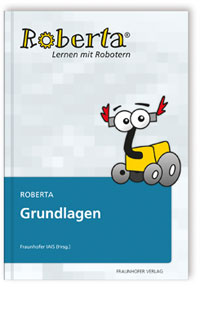
Dieser Band stellt das Roberta-Konzept vor und enthält Grundlagen zur Planung und Durchführung von Roberta-Kursen. Dazu gehören insbesondere didaktische Hinweise zur gendergerechten Kursgestaltung. Explizit werden die beiden Roboter-Baukastensysteme LEGO MINDSTORMS NXT und LEGO MINDSTORMS EV3 vorgestellt. Des Weiteren gibt das Buch einen Überblick über den Einsatz und die Verwendung von Robotern in der heutigen Gesellschaft. Aufgrund der zahlreichen Aufgabenstellungen mit unterschiedlichem Schwierigkeitsgrad, bietet dieser Band gerade für Lehrkräfte viele Anregungen zur Gestaltung eigener Roberta-Kurse. Alle im Buch enthaltenen Aufgabenstellungen folgen dem langjährig erprobten Roberta-Konzept und können kostenfrei auf dem Roberta-Portal heruntergeladen werden.